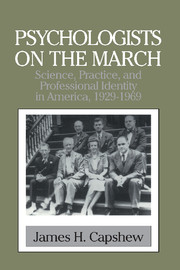Book contents
- Frontmatter
- Contents
- Acknowledgments
- List of Abbreviations
- Introduction: The Psychologists' War
- Interlude I
- 1 Growing Pains: After the Great War
- 2 Mobilizing for World War II: From National Defense to Professional Unity
- 3 Home Fires: Female Psychologists and the Politics of Gender
- Interlude II
- 4 Sorting Soldiers: Psychology as Personnel Management
- 5 Applied Human Relations: The Utility of Social Psychology
- 6 From the Margins: Making the Clinical Connection
- 7 Engineering Behavior: Applied Experimental Psychology
- Interlude III
- 8 A New Order: Postwar Support for Psychology
- 9 Remodeling the Academic Home
- Interlude IV
- 10 The Mirror of Practice: Toward a Reflexive Science
- 11 Beyond the Laboratory: Giving Psychology Away
- Interlude V
- Epilogue: Science in Search of Self
- Index
Interlude II
Published online by Cambridge University Press: 06 July 2010
- Frontmatter
- Contents
- Acknowledgments
- List of Abbreviations
- Introduction: The Psychologists' War
- Interlude I
- 1 Growing Pains: After the Great War
- 2 Mobilizing for World War II: From National Defense to Professional Unity
- 3 Home Fires: Female Psychologists and the Politics of Gender
- Interlude II
- 4 Sorting Soldiers: Psychology as Personnel Management
- 5 Applied Human Relations: The Utility of Social Psychology
- 6 From the Margins: Making the Clinical Connection
- 7 Engineering Behavior: Applied Experimental Psychology
- Interlude III
- 8 A New Order: Postwar Support for Psychology
- 9 Remodeling the Academic Home
- Interlude IV
- 10 The Mirror of Practice: Toward a Reflexive Science
- 11 Beyond the Laboratory: Giving Psychology Away
- Interlude V
- Epilogue: Science in Search of Self
- Index
Summary
A History of Experimental Psychology was not the comprehensive work that Edwin Boring had envisioned. His original plan had been “to start with the men and the schools as an introduction and then to trace the history of experimentation and thought in the fields of sensation, perception, feeling, emotion, learning, memory, attention, action and thought.” Despite its title, the 1929 book contained only the introductory portion of the larger project, and Boring belatedly realized that he “had not yet got to the experimentation in experimental psychology.” Throughout the 1930s he worked on the conceptual and technical history of research in sensation and perception, which he considered the core of scientific psychology.
In addition to his historical research, Boring tried his hand at textbook writing. Concerned that introductory psychology books did not emphasize strongly enough the findings of experimental research, he collaborated with two longtime professional allies to produce Psychology: A Factual Textbook, published in 1935. Boring's coauthors were Herbert S. Langfeld, his predecessor at Harvard and then head of the psychology department at Princeton, and Harry P. Weld, a professor at Cornell whom he had known since before the First World War. All three men shared a strong positive bias toward the experimental tradition in psychology.
Seeking to produce “an authoritative text” that avoided wrangling over theoretical perspectives, the trio wanted the book “to be science but to have no special point of view.”
- Type
- Chapter
- Information
- Psychologists on the MarchScience, Practice, and Professional Identity in America, 1929–1969, pp. 91 - 96Publisher: Cambridge University PressPrint publication year: 1999

